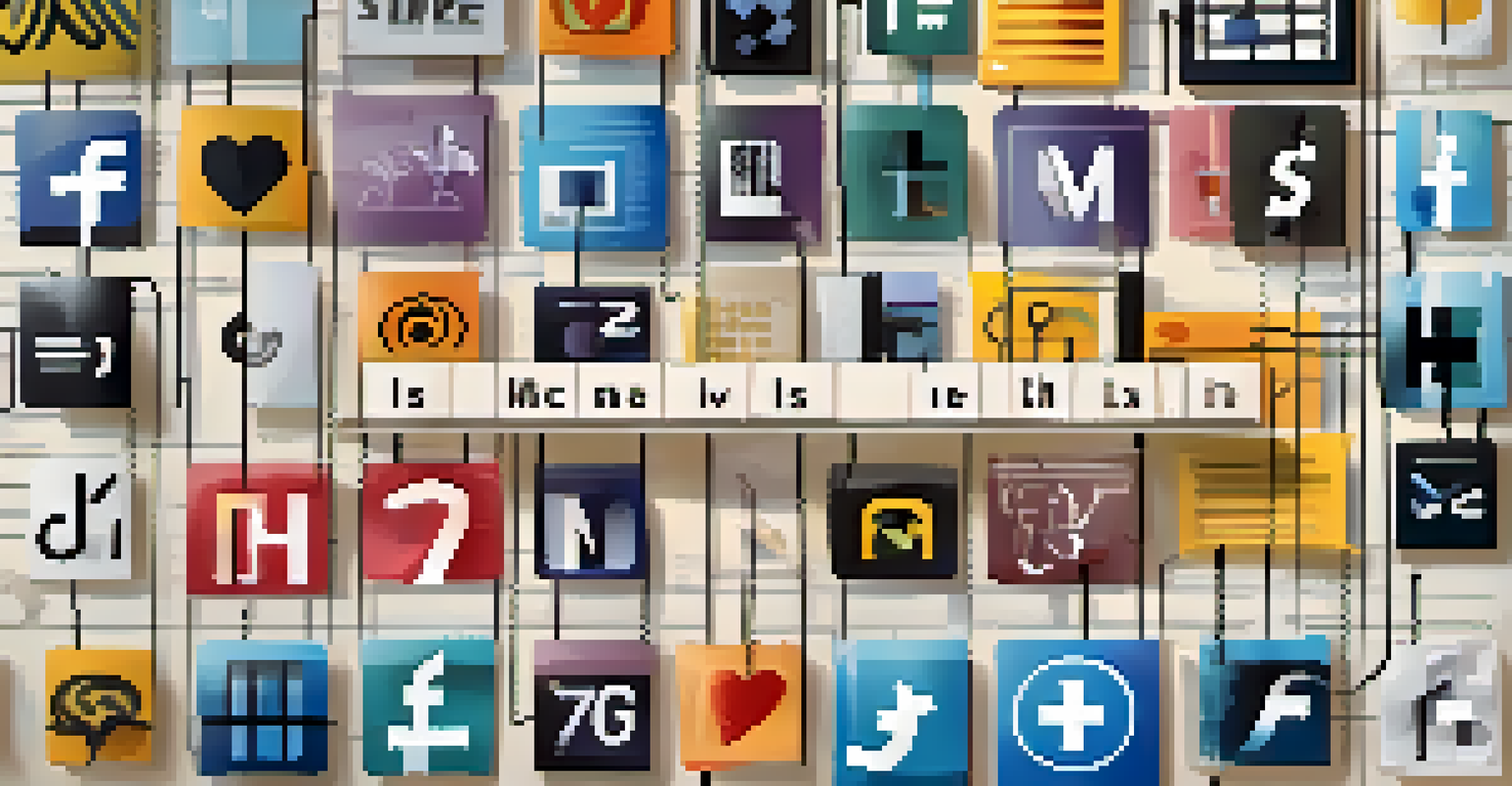Social Media as a Tool for Mental Health Advocacy

The Rise of Social Media in Mental Health Conversations
In recent years, social media has transformed the way we discuss mental health issues. Platforms like Instagram, Twitter, and TikTok have become popular spaces for individuals to share their personal stories, creating a community of support. This shift not only raises awareness but also helps to reduce stigma, as more people feel encouraged to speak openly about their experiences.
Social media is a tool for connection, but it can also be a mirror reflecting our insecurities.
By sharing their journeys, individuals can connect with others facing similar challenges, fostering a sense of belonging. For example, hashtags like #MentalHealthMatters and #BreakTheStigma have gained traction, allowing users to easily find and join conversations around mental well-being. This accessibility can make a significant difference, especially for those who may feel isolated in their struggles.
Moreover, mental health organizations are leveraging these platforms to reach wider audiences, providing valuable resources and information. This increased visibility can empower individuals to seek help, whether through professional services or peer support networks, ultimately enhancing overall mental health advocacy.
Creating Supportive Online Communities
Social media has a unique ability to cultivate supportive online communities where individuals can share their thoughts and feelings. These spaces often encourage open dialogue, helping users to feel less alone in their mental health struggles. For instance, Facebook groups dedicated to mental health topics allow members to share coping strategies and offer encouragement.

In these communities, users can find a sense of validation and understanding that may be lacking in their offline lives. The anonymity that social media provides can also empower individuals to express themselves more freely. This is particularly beneficial for those who might hesitate to discuss their mental health in person due to fear of judgment.
Social Media Reduces Mental Health Stigma
Platforms like Instagram and TikTok foster open discussions, encouraging individuals to share their mental health experiences and reduce stigma.
However, it’s important to remember that while online communities can offer support, they should not replace professional help. Encouraging members to seek therapy or counseling when necessary can ensure that they receive appropriate care, reinforcing the idea that reaching out for help is a sign of strength.
Mental Health Awareness Campaigns on Social Media
Many organizations and advocates have harnessed social media to launch impactful mental health awareness campaigns. Campaigns like #BellLetsTalk and #WorldMentalHealthDay have successfully engaged millions, encouraging people to share their experiences and educate others about mental health. These initiatives are instrumental in spreading awareness and fostering empathy.
Talking about mental health can help break the stigma and create a community of support.
By using visually engaging content, such as infographics and videos, these campaigns can capture attention and convey important messages quickly. The shareability of posts also means that information can reach a wider audience, amplifying the impact of the campaign. For instance, a single tweet can spark a conversation that spreads across the globe.
Ultimately, these campaigns not only raise awareness but also encourage policy changes and increase funding for mental health services. When social media users come together for a common cause, they can create a powerful collective voice that influences change and promotes mental health advocacy.
The Role of Influencers in Mental Health Advocacy
Influencers play a significant role in shaping conversations around mental health on social media. Many prominent figures openly discuss their own mental health struggles, breaking down barriers and encouraging followers to seek help. This visibility can have a profound impact, particularly on younger audiences who may idolize these influencers.
For example, when celebrities share their experiences with anxiety or depression, it normalizes these feelings and encourages others to seek help. Followers often feel more comfortable discussing their mental health when they see someone they admire doing the same. This ripple effect can foster a culture of openness and acceptance.
Supportive Online Communities Thrive
Social media cultivates communities where users find validation and encouragement, although it's important to seek professional help when needed.
However, it’s crucial for influencers to approach these topics responsibly. Misinformation or trivialization of mental health issues can be harmful, so influencers should provide accurate information and encourage professional resources. By doing so, they can truly contribute to mental health advocacy in a meaningful way.
Addressing Misinformation and Harmful Content
While social media can be a powerful tool for mental health advocacy, it also has its downsides, particularly regarding misinformation. The prevalence of unverified advice or harmful content can lead to misunderstandings about mental health conditions. It’s essential for users to critically evaluate the information they encounter online.
To combat this, mental health organizations and professionals often take to social media to debunk myths and provide evidence-based information. By sharing accurate resources and engaging in discussions, they can help to clarify misconceptions. This proactive approach is vital in creating an informed online community.
Furthermore, social media platforms themselves are becoming more aware of the importance of mental health. Many are implementing features that promote mental well-being, such as resources for users in crisis. This collaborative effort between individuals and platforms can create a safer online environment for discussing mental health.
The Impact of Social Media on Mental Health
While social media can foster connection and support, it can also have adverse effects on mental health. The constant comparison to others’ curated lives can lead to feelings of inadequacy or anxiety. It's important for users to cultivate a healthy relationship with social media to mitigate these risks.
Setting boundaries, such as limiting screen time or curating feeds to include positive content, can help users maintain a balanced perspective. Engaging with uplifting posts or following accounts that promote mental health awareness can create a more supportive online experience. This way, social media becomes a tool for positivity rather than stress.
Misinformation Poses Mental Health Risks
While social media can provide support, it also spreads misinformation, making it essential for users to critically evaluate the information they encounter.
Additionally, being aware of one's emotional responses to social media can empower users to take control of their mental well-being. If a particular platform or interaction consistently leads to negative feelings, it’s okay to step back or even take a break. Prioritizing mental health in the digital age is essential for overall well-being.
Future Trends in Social Media and Mental Health Advocacy
As technology evolves, so too does the potential for social media to support mental health advocacy. Emerging platforms and features, such as virtual reality and interactive content, may offer new ways for users to engage with mental health resources. This innovation can enhance the experience of seeking support and foster deeper connections among users.
Additionally, increased collaboration between mental health professionals and social media platforms can lead to more effective advocacy efforts. By developing tools and resources tailored to user needs, these partnerships can create a more supportive online environment. This could include features like mental health check-ins or direct connections to resources.

Ultimately, the future of social media in mental health advocacy looks promising. With continued focus on responsible usage and informed discussions, social media can become an even more powerful ally in promoting mental health awareness and support. The goal is to create a digital space where everyone feels safe to share and seek help.